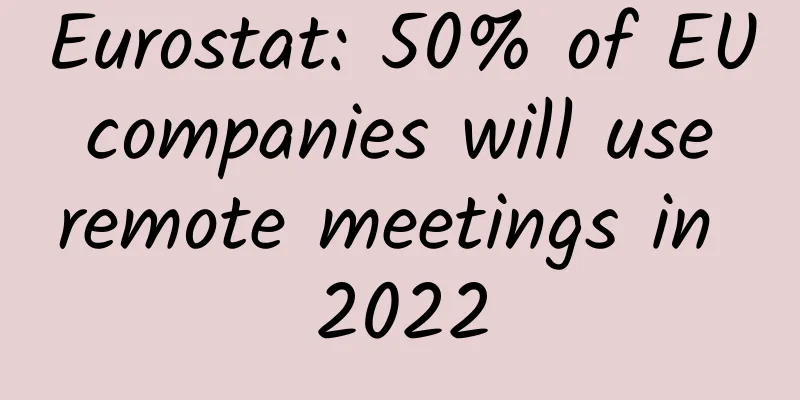Eurostat: 50% of EU companies will use remote meetings in 2022

|
Internet connectivity is essential for most businesses to operate and conduct activities online. In the EU, almost all businesses (94%) have broadband internet access. This applies regardless of the size of the business, as 94% of small and medium-sized enterprises (SMEs) and 99% of large businesses use broadband by 2022. More than half of EU businesses use social media and half conduct online meetings In 2021, 59% of businesses in the EU used social media, compared to 37% in 2015. Differences also emerged based on business size, with large businesses (83%) more likely to use social media than SMEs (58%). The most popular social media for businesses are:
In 2022, 50% of EU companies conducted remote meetings through online platforms such as Skype, Zoom, MS Teams and WebEx. In terms of company size, online meetings are very popular among large enterprises (93%), but less common among small and medium-sized enterprises (49%). In 2022, Sweden and Finland had the highest proportion of companies holding online meetings (both 79%), followed by Denmark (78%) and Malta (68%). To enable employees to work remotely, companies can give them remote access to different types of resources. In 2022, in the EU:
E-commerce E-commerce offers businesses the possibility to sell goods or services to online customers via the Internet, thereby supplementing or replacing traditional sales channels such as in-store sales. In 2022, 23% of EU businesses used e-commerce to sell their products and services in the previous year, compared to 16% in 2012. 19% of EU businesses use a website or app to sell goods or services. 17% sell goods and services online through their own website or app; 9% use an e-commerce marketplace. Online sales account for 18% of EU business turnover Looking at turnover generated from online sales, EU companies reported online sales accounting for 18% of their total turnover in 2022, up from 14% in 2012. This proportion was higher for large companies (23%) than for SMEs (11%). ICT Security 22% of EU companies experienced an ICT security incident in 2022. The highest percentage of companies reporting ICT security incidents was in Finland (44%), followed by the Netherlands and Poland (both 30%), while the lowest percentages were in Bulgaria (11%), Portugal and Slovakia (both 12%). 92% of EU companies use at least one ICT security measure in 2022. Across EU countries, this percentage ranges from 75% in Greece and 79% in Hungary to 98% in Denmark and Finland. The most commonly used measures are:
58% of EU companies inform employees of their ICT security obligations Some 58% of EU companies make their employees aware of their obligations on ICT security-related issues. To achieve this, 42% of companies provide voluntary ICT security training, 21% conduct mandatory ICT security training, and 32% include ICT security obligations in employee contracts. |
>>: Activate: Technology and Media Outlook 2024
Recommend
The efficacy and function of Fritillaria cirrhosa[picture]
I don't know if you are familiar with Fritill...
Does Jiaogulan detoxify?
Gynostemma pentaphyllum is a very common medicine...
Faced with the increasing proportion of JN.1 variants, how should we respond this winter and next spring?
With the arrival of winter vacation and Spring Fe...
Can glycerin remove fat particles?
Glycerin is a common skin care product in our liv...
Don’t drink this kind of soy milk! It’s easy to get poisoned! Tell your family immediately!
recently A netizen made homemade soy milk in the ...
Giant konjac, welwitschia orchid, sea coconut... you can see these exotic plants without going abroad
END Tadpole's original work, please indicate ...
The efficacy and function of Hezhangxiao
Traditional Chinese medicine is very effective in...
Want to show off your grapefruit diet? Don’t be blind, listen to what the experts say
Now is the season for grapefruit, which is a grea...
Teddy bear travels 10,000 meters in the sky! Looks high? But it’s not in space!
In recent days, a video of several college studen...
The efficacy and function of Ussuri Scutellariae
The occurrence of diseases requires the improveme...
What is the structure of a neutron star? Like a chocolate bar
What's the tastiest-looking celestial object?...
This fleshy worm knows the "gun fighting technique" in the "God Drama"
Recently, the sand dollar has become a hot topic ...
The efficacy and function of bindweed
Bindweed is a traditional Chinese medicine. In ad...
The efficacy and function of ganoderma
Ganoderma lucidum is a common Chinese medicine wi...








![[Grain Policy of a Great Country] Can potatoes be transformed into rice? Black technology sets off a "revolution" in staple food](/upload/images/67eff896b9488.webp)
